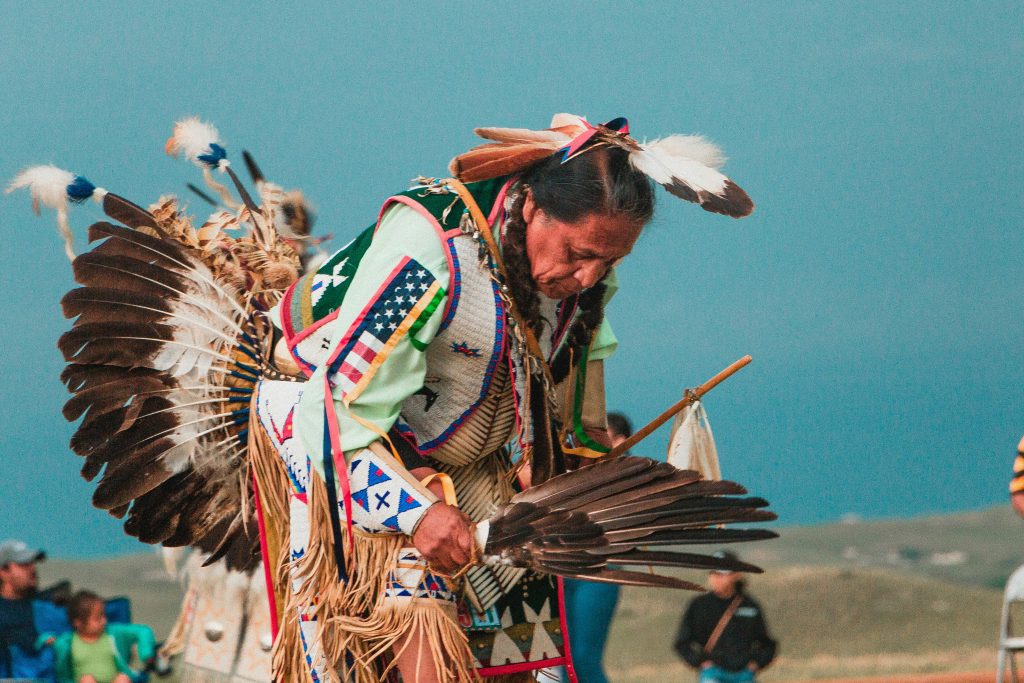The dynamic approach of a government grantmaking agency is harnessing pursuit of the common good
‘Democracy demands wisdom and vision in its citizens,’ declares the US legislation that created the National Endowment for the Humanities (NEH) in 1965. It calls on NEH to support the humanities in order to help us ‘achieve a better understanding of the past, a better analysis of the present, and a better view of the future’.
The creation of a government grantmaking agency to strengthen the US’s cultural institutions, research, and education in the humanities underlined its importance to the common good and our national interest. The humanities shape our understanding of ourselves and the world we inhabit. They inspire curiosity about our own experiences and those of our neighbours. They guide us to informed and ethical decision-making in our personal choices and in the implementation of public policies and new technologies.

A Lakota Native American at a powwow in South Dakota. The NEH is prioritising the expansion of outreach and funding to historically overlooked organisations and communities. Credit: Unsplash
In an era marked by rampant misinformation, disenfranchisement, and stark political, religious and cultural divides, the need for a well-supported humanities sector has become even more urgent. At NEH, we are redoubling our efforts to connect humanities research and programmes to the common good.
Three key issues
Through our agency’s ongoing initiative American Tapestry: Weaving Together Past, Present, and Future, NEH is leveraging the humanities to help us as a society address some of the greatest challenges that impinge on the common good, namely: the shoring up of American democratic traditions and institutions, advancing equity for all, and protecting our cultural inheritance from the effects of climate change. We believe these three issues in particular have far-reaching implications for all American communities and that the humanities offer unique perspectives for discussing and responding to these challenges.
NEH funds a national project, Educating for American Democracy, which has developed a roadmap for improving the teaching of US history and civics at every grade level and is now in use in pilot programmes at schools across the country. We support National History Day, a national educational competition that engages middle- and high-school students in original historical research, building familiarity with research methods while fostering a love of learning.
Science helps us in creating new technologies, but the humanities are what allow us to anticipate their impact on our society, culture, and civil liberties. Artificial intelligence presents unknown dangers and opportunities for global citizens to navigate. The agency supports research that seeks to understand and address the ethical, legal, and societal implications of AI.
We are also placing the humanities at the centre of community discussion and efforts to address an alarming rise in hate-motivated violence and extremism across the country. NEH’s United We Stand: Connecting Through Culture initiative supports humanities-based programming to combat hate-motivated violence; promote civic engagement, social cohesion, and cross-cultural understanding; and strengthen mental health outcomes in communities across the US. Since announcing the initiative in 2022, NEH has issued more than $12 million in funding in all 56 states and jurisdictions.
Shining a light in dark corners
Humanities resources remain unevenly distributed across the country, so NEH has made it a priority to expand our outreach and funding to organisations and communities that have historically been overlooked. As a part of the federal government, we have a duty to ensure NEH’s grantmaking serves all Americans and I firmly believe when we invest in organisations, resources, and projects that reflect the cultures and experiences of groups who have most often been at the margins, we are creating stronger communities whose members see themselves as part of the national story and take pride in sharing their history and heritage.
Through projects to support Spanish-speaking students in enhancing English proficiency and college readiness, funding for historic sites, or teacher workshops on the history of Japanese incarceration in the US during the Second World War, NEH grants are helping lift up the stories of individuals and groups that have often been absent from American history. As a Navajo, I am especially proud of NEH’s partnership with the US Department of the Interior on the Federal Indian Boarding School Initiative. This will shed light on the system of federally-funded boarding schools that, from 1819 through the 1970s, removed Native American children from their families and communities with the goal of erasing Native culture and languages.
A cultural response to the climate crisis
In light of the threats to the common good posed by climate change, we have supported a number of programmes, including a programme to provide funding for community-led projects to document and safeguard community history and cultural resources threatened by climate change. We have also supported development of the new Climate Resilience Resources for Cultural Heritage, a suite of free resources to assist stewards of archaeological, cultural, and historic sites and museums in evaluating their climate-related hazard risk and in developing a strategy to
combat the impacts of climate change on collections and communities. As we work collectively to find solutions to the global climate crisis, these protective measures will help ensure our most valuable physical records of human thought, history, and achievement remain accessible as a source of meaning, inspiration, and connection for future generations.
Applying the lessons, empathy, and sense of belonging that the humanities foster to the challenges communities around the world are grappling with will help us collectively build a future of greater cooperation, understanding, equity and resilience.
Shelly C. Lowe (Navajo) is chair of the National Endowment for the Humanities.
media@neh.gov





Comments (0)